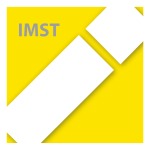
IMST is a flexible support system. The aim is to support teachers in the implementation of innovations in MINDT instruction (German abbreviation for Mathematics, Informatics, Natural Science, German, Technology) at Austrian schools. IMST uses two support approaches: topic-specific support and support in regional networks.
The solution approach of IMST consists of scientists accompanying teachers in their endeavours to improve instruction. Networks serve as places of exchange, where teachers and teacher trainers can communicate their experiences of instruction and school. IMST has an impact on the individual instruction, and also on the structures in the educational sphere: teachers carry out innovative instructional and school projects and collaborate in networks. At the same time, IMST offers much more: University Colleges of Teacher Education and Universities work together closely in the thematic programmes. Representatives of the State Educational Boards also participate in the networks. Thus, apart from long-term structural discussions, stable cooperation arrangements can be established, providing access to the benefits of synergies within the education system.
Further information is available at http://www.imst.ac.at
Fibonacci ist ein internationales EU-Bildungsprojekt (im 7. Rahmenprogramm) zur Verbreitung des forschenden Lernens im Mathematik- und Naturwissenschaftsunterricht in Europa. Das Institut für Unterrichts- und Schulentwicklung (IUS) an der Alpen-Adria-Universität Klagenfurt ist eines von zwölf Reference Centres, von denen ausgehend die europaweite Verbreitung von Unterrichts- und Schulinnovationen erfolgt. Hauptziel des Programms Fibonacci ist die Entwicklung eines europäischen Konzepts zur Förderung des mathematisch-naturwissenschaftlichen Unterrichts, basierend auf forschend-entdeckenden Unterrichtsmethoden. Fibonacci baut auf bestehenden nationalen Projekten wie Pollen, Sinus und IMST sowie weiteren Initiativen auf.
Im Bundesland Kärnten wird – zusätzlich zu den bestehenden Themenprogrammen des Projekts IMST – ein regionales Themenprogramm zur inhaltlichen Stärkung des Informatikunterrichts und zur Verbreitung der dabei gewonnenen Erfahrungen und „good practices“ eingerichtet. Dieses Themenprogramm wird vom Kärntner Wirtschaftsförderungsfonds (KWF) im Rahmen der Umsetzung der Strategie »Kärnten 2020 – Zukunft durch Innovation« unterstützt und gefördert.
Worum geht es bei „Informatik kreativ unterrichten“?
Informatik ist ein technisches Unterrichtsfach. Als solches ist es in der Volksschule noch nicht vertreten. Aber dennoch werden in der Volksschule bereits die Grundlagen für Interessen oder für die Ablehnung für Technik gelegt. Somit sind Volksschulen gleichermaßen im Zentrum dieser Ausschreibung wie die Sekundarstufe. Demgemäß werden Projekte gefördert, die auf altersgruppenspezifische Weise Kindern bzw. Jugendlichen technisches, insbesondere informationstechnisches Interesse wecken bzw. Verständnis näherbringen.
Im Auftrag des Kärntner Wirtschaftsförderungsfonds wird am IUS das Projekt „Zentrale Maßnahmen zur Förderung des Kärntner Schulwesens“ durchgeführt. Ziel des Projekts ist eine gut begründete Übersicht über Stärken und Schwächen sowie Entwicklungsprioritäten des Kärntner Schulwesens, um die Effektivität des Einsatzes von Förderungsmitteln zu erhöhen. Die Übersicht soll durch Erhebung empirischer Daten mittels Interviews und Fragebogen und diskursive Einbeziehung einer Runde von ExpertInnen aus Schule, Schulverwaltung und Wirtschaft vorbereitet werden und schließlich zu Vorschlägen für Entwicklungsprioritäten führen.
 The project „Developing Key Competences by Mathematics Education“ (KeyCoMath) aims at the development of students’ key competences in primary and secondary schools. Didactic concepts, teaching and learning material as well as corresponding assessment methods for mathematics education are developed, tested, evaluated and disseminated on the European level. „KeyCoMath“ uses the power of initial and in-service teacher education to put innovative pedagogical and didactical approaches into practice.
The project „Developing Key Competences by Mathematics Education“ (KeyCoMath) aims at the development of students’ key competences in primary and secondary schools. Didactic concepts, teaching and learning material as well as corresponding assessment methods for mathematics education are developed, tested, evaluated and disseminated on the European level. „KeyCoMath“ uses the power of initial and in-service teacher education to put innovative pedagogical and didactical approaches into practice.
Key competences are necessary for all citizens for personal fulfilment, active citizenship, social inclusion and employability in a knowledge society. The project „KeyCoMath“ develops, implements, and evaluates ways of working according to the “European Reference Framework of Key Competences for Lifelong Learning” in mathematics education.
„KeyCoMath“ aims at fundamental changes of pupils’ learning. A shift towards more active, exploratory, self-regulated, autonomous, communicative and collaborative learning is intended. This way of doing mathematics helps to develop a broad variety of key competences. Weitere Informationen finden Sie unter http://www.keycomath.eu/
Data about the educational sector is compiled and prepared for publication in the National Report on Education, which serves policy-makers and public administration as relevant control knowledge. Today, many countries regard reports on education as important foundations for evidence based educational policy decisions.
Im nationalen Bildungsbericht werden von Expertinnen und Experten Daten und wissenschaftliche Erkenntnisse über das Bildungswesen aufbereitet, die dann für Politik und Verwaltung als Steuerungswissen dienen sollen. In vielen Ländern sind Bildungsberichte heute wichtige Grundlagen evidenzbasierter bildungspolitischer Entscheidungen.
Weitere Projekte von Konrad Krainer finden Sie in der Forschungsdokumentation.

